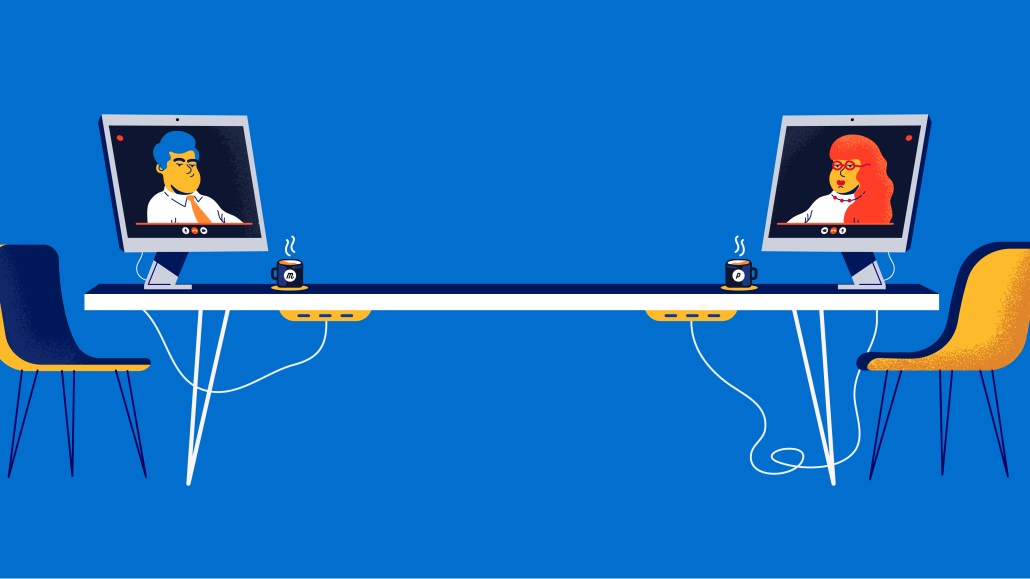Secure your place at the Digiday Media Buying Summit in Nashville, March 2-4
‘It will have no impact on the marketplace’: Coronavirus cancelations will test the use of the upfronts

Coronavirus has not canceled the upfronts, but it is changing the TV-and-video industry’s annual ad buying cycle.
YouTube and Twitter have joined Fox News, A&E Networks and AMC Networks in deciding to cancel its in-person upfront presentation in light of the coronavirus outbreak. Meanwhile, the Interactive Advertising Bureau will enable Digital Content NewFronts presenters to stream their presentations. More TV networks, streaming services and digital video publishers are likely to follow suit. But, that trend is unlikely to derail upfront deals from getting done, according to agency executives. “It will have no impact on the marketplace,” said one ad agency executive of the presentation cancellations.
These cancellations call into question the importance of the upfront presentation moving forward, though that’s not a new question. “That’s been a question for years, regardless of the coronavirus,” said a second agency executive. Coronavirus could provide the answer. While these presentations provide an opportunity for advertisers and agencies to convene and see how programmers are pitching themselves to the entire industry, the events themselves are not all that meaningful when it comes to how advertisers decide to divvy up their dollars. “No one is making a decision coming out of a Tuesday morning presentation,” said the first agency executive. If the TV networks and other upfront presenters see that they did not lose business because they did not host an event, they may deduce there’s no incentive for them to pay to host an upfront presentation next year.
However, while the presentations’ cancellation may not ultimately matter, coronavirus could still have an impact on the upfront marketplace this year. Considering how quickly the outbreak has spread, it’s too early to say one way or the other. But, given the uncertainty around the outbreak’s containment and the sales impact some businesses are already experiencing, some advertisers could cut back on the amount of money they may be willing to commit to spend in this year’s upfront marketplace. “If it’s still going on in a few months, it could impact clients’ ability to commit. But we’re not there yet,” said the second agency executive.
As for any immediate impact, coronavirus has forced some changes in how companies do business in the upfront, but companies are still doing business in the upfront. “A lot of the larger holding company negotiations and discussions have already started,” said a third agency executive.
However, coronavirus is making advertisers and agencies adjust how they handle the upfronts. Many agencies have restricted travel for their employees, including some that have barred domestic business travel, and that has affected the meetings between advertisers and agencies to map out clients’ upfront buying strategies. “Right now we are planning remote meetings for pre-upfront conversations and WebExes and things like that with clients,” said a fourth agency executive.
As part of that upfront planning, agency executives are gauging the potential for clients to pull money out of the upfront because of coronavirus-related concerns. While advertisers in categories like travel are more hesitant to increase the amount of money they plan to spend in the upfront, the agency executives said that they have not yet seen signs of a drop-off. “I don’t think we’ll see millions of dollars drop out of the upfront,” said the third agency executive.
Odd as it may sound, advertisers have financial incentives for keeping their money in the upfront marketplace. While TV networks lobby for price increases in each upfront cycle, legacy upfront advertisers are working off a lower base price that was set years, if not decades, ago. This is why TV networks make such a big fuss about newer advertisers, like direct-to-consumer marketers and tech companies, participating in the upfront: those companies pay higher base rates. Because of this dynamic, any legacy advertiser that pulls out of the upfront would lose that base pricing and would have to pay the market rate if they were to return a year from now.
That said, the agency executives acknowledged that clients’ wallets could tighten if coronavirus escalates into a pandemic. “The next couple weeks will be really telling if clients are going to be cautious going into the upfront,” said the first agency executive.
More in Future of TV

Future of TV Briefing: CTV identity matches are usually wrong
This week’s Future of TV Briefing looks at a Truthset study showing the error rate for matches between IP and deterministic IDs like email addresses can exceed 84%.

Future of TV Briefing: How AI agents prime TV advertising for ‘premium automation’
This week’s Future of TV Briefing looks at how agentic AI can enable TV networks to automate the sales of complex linear TV ad packages.

Inside NBCUniversal’s test to use AI agents to sell ads against a live NFL game
NBCUniversal’s Ryan McConville joined the Digiday Podcast to break down the mechanics of the company’s first-of-its-kind agentic AI ad sales test.





